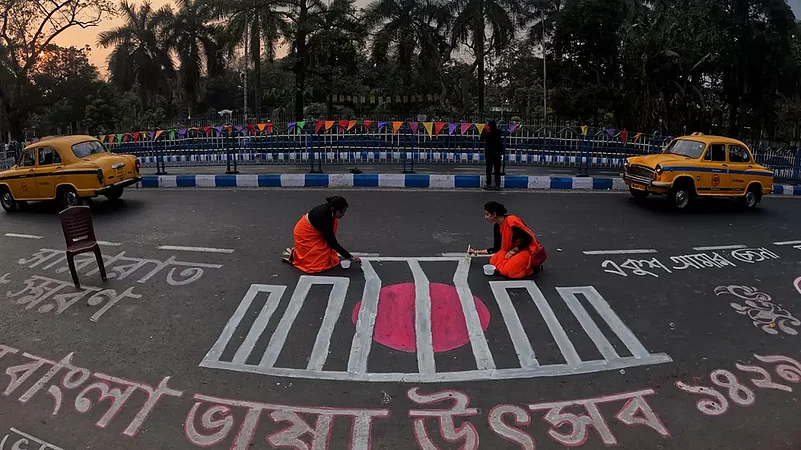Noted linguist, literary critic and cultural activist GN Devy told a packed auditorium in the Jawaharlal Nehru University that preserving the linguistic diversity of India and the World was key to resist the erosion of democracy and the accompanying loss of courage through an illusion of order.?
Linguistic Diversity Helps Defeat Totalitarian Regimes: GN Devy Tells JNU
Prof. Devy delivered the 10th Sunil Memorial Lecture on November 17 at JNU’s School of Arts and Aesthetics Auditorium, titled 'Language Diversity and the Making of India,' in which he briefly analysed the history of the Indian subcontinent through major linguistic changes, and how they shaped the country that we live in.?

Prof. Devy delivered the 10th Sunil Memorial Lecture on November 17 at JNU’s School of Arts and Aesthetics Auditorium, titled “Language Diversity and the Making of India,” in which he briefly analysed the history of the Indian subcontinent through major linguistic changes, and how they shaped the country that we live in.?
In a session chaired by Prof. Asha Sarangi, from JNU’s Centre for Political Studies, Devy – who has just returned after a tour of United States to promote his recent book “Indians: a History of Civilisations” (co-edited with Tony Joseph and Ravi Korisettar) – attempted to reconstruct history from the linguistic perspective. He explained that languages formed wherever pre-historic humans ( hunter-gatherers) arriving in the subcontinent stayed put in large numbers and formed a ‘population knot.’ Since India – just like other linguistically rich countries like Papua New Guinea, Indonesia or Nigeria – had an abundance of food at the time, it became home to among the largest number of languages in the world (1,652 mother tongues according to the 1961 census).?
However, major historic shifts deeply affected the linguistic diversity: firstly the advent of agriculture, and then the arrival of languages from the Indo-European family, that changed the landscape not just in terms of words, but also the thought. Devy argued that India was “made” several times through its languages, transforming again after 1,000 AD as the influences of the Middle East and the saint-poets again democratised language, as translations of literature were carried out for the first time, and “God became approachable”.?
The next major shift, according to Devy, came with colonialism and exposure to the West, and most of India’s knowledge and literature was trashed as “oral.” However, upon independence, India’s makers chose to establish it as a multilingual nation, even though the European concept of nation was monolingual. The linguist stressed that the two nations in Europe that experienced the most aggressive linguistic nationalism – Italy and Germany – eventually turned fascist, and therefore urged the audience to take threats associated with India’s loss of languages seriously. In the 2011 census, the country was left with 1,369 mother-tongues, signalling the loss of around 280 languages in 50 years.?
Devy, who has advocated the rights of the denotified tribes for years, insisted that these marginalised communities – unjustly dubbed criminals – were being rendered voiceless by the killing of their languages, along with coastal communities such as Gujarat’s Kharwas and Adivasis in general. Summing up, he linked the loss of languages with the societies’ alienation from ecology and the shrinking democratic space, and urged the students and youth to find a way to preserve the linguistic diversity, and thereby the nation.?
The annual lecture is held in the memory of Sunil, a JNU alumnus who left his research at the university midway in the 1980s to become a full-time political activist in Madhya Pradesh, championing the rights of the marginalised, especially the Adivasis. Spending around 30-years in a tiny tribal hamlet in MP’s Hoshangabad (now Narmadapuram) district before his untimely death in 2014, he led successful struggles for the locals’ right to natural resources and helped establish a cooperative fisheries federation for the Adivasi communities displaced by the Tawa reservoir. Sunil was a key leader of Samajwadi Jan Parishad, a socialist party that emerged out of people’s movements in the 1990s, apart from a regular contributor on economics and other issues in Hindi dailies and wrote dozens of booklets explaining socio-economic contradictions of the system for the common people, from a socialist perspective.?
The trust has been established mainly by Sunil’s former professors, contemporaries in JNU and other similar-minded people, many of whom had taken active part in student politics on campus along with the activist in the early 1980s. It aims to bring a grassroot perspective to academic and political discourse, in line with Sunil’s life and thought. In the past, the Sunil Memorial Lecture has been delivered by eminent speakers across fields such as Shekhar Pathak, Sunita Narain, Ramachandra Guha, Gopalkrishna Gandhi, Amit Bhaduri, Ravish Kumar, Dr. Mathew Varghese, Madan Lokur and P. Sainath.

























